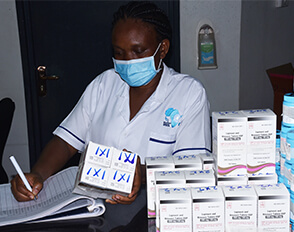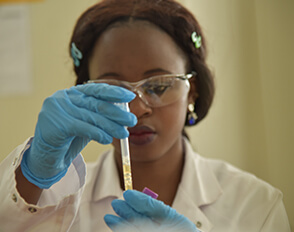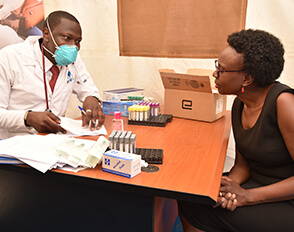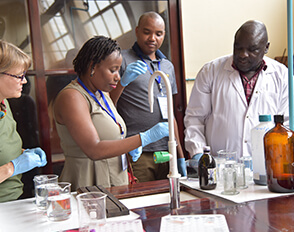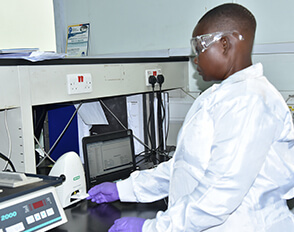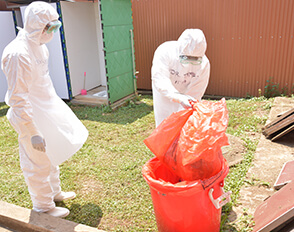
Frequently Asked Questions about HIV Care and the IDI Clinics
How do I know if I have HIV?
Many people with HIV do not show any signs of having the infection at all. Some people may lose weight or suffer from lots of small or big infections. It is possible for one partner in a couple to be HIV positive and one to be HIV negative. Therefore, it is important to have an HIV test. This is a simple blood test, which can be done easily, and the results can be ready whilst you wait. You can have blood tests done as a couple. We do not offer routine HIV tests at IDI, but these are available at most government clinics such as KCCA Clinics, Mulago Hospital, Health Centre IVs and Health Centre IIIs. TASO, Uganda Cares, and AIDS Information Centre (AIC) also offer tests.
How do I know if I have TB?
TB commonly causes a cough and fever in those who are infected. It can also cause lack of appetite and weight loss. However, some people may get different symptoms, such as swellings in the armpits and groin, abdominal pains and discomfort and meningitis. A test can be done by your clinic to test your sputum (the liquid that comes up when you cough) or an x-ray. Occasionally a blood test, a tissue sample test or an ultrasound can show if someone has TB.
How do I know if have a sexually transmitted infection?
There are lots of different sexually transmitted infections, and lots of ways they show themselves. Some infections such as syphilis and hepatitis can be present without causing any health problems. Sometimes people have wounds on their private parts, or a discharge from their private parts. Some people have bumps or lumps. Some get liver problems and jaundice (yellow skin and eyes). We can do blood tests for some infections and a swab test for others. We also offer treatment for these in the clinic.
How do I stop my baby from getting HIV?
The most important thing to do is to check your HIV status and ask your partner to have a test as well. If you test HIV positive, it is important for you to immediately enroll and start receiving HIV treatment, care and monitoring. By enrolling into care early when you are pregnant, the risk of transmitting HIV to your baby can be greatly reduced. Your HIV doctor can give you more advice on breastfeeding and other treatments whilst you are pregnant.
How can I come to the clinic at IDI?
Once you have had an HIV test and found to be HIV positive, you can register for care at IDI. You need to come to the reception at IDI on a working day (Monday to Friday). At the moment we have very many patients, so once you are stable on treatment we may ask you to transfer from IDI Mulago to a KCCA or other clinic nearer to your home. If your doctor thinks that you might need one of our specialist clinics, they can write us a referral letter or call us, and this will help you to get an appointment more quickly. When you come to clinic for the first time, it is important to bring any medical records and test results that you have, as well as all medication you are taking.
What is a CD4 count?
Your blood is made of red and white blood cells. Red blood cells carry oxygen around the body. White blood cells are the body’s defences against infection. One type of white blood cell is killed very easily by HIV and we call this the CD4 cell. We can measure the number of CD4 cells to tell us how well someone is, and how much the HIV has affected them. The normal CD4 count ranges between 800 and 1500. In HIV infected individuals, the virus continually attack and kill CD4 cells which leads to the progressing weakening of the body immunity and therefore vulnerable to opportunistic infections. Anyone who tests HIV positive therefore needs to start antiretroviral treatment immediately to avoid immunity damage and resultant ill-health.
What is a viral load test?
This measures the actual amount of HIV in the blood. We use this test to assess how well the drugs are working to fight the HIV virus. Treatment is aimed at lowering the amount of virus in blood to the lowest level possible (undetectable viral load).
Why do I need to take Septrin?
Septrin is a common anti-bacterial (antibiotic) treatment. All persons with HIV, whatever their CD4 count, are advised to take Septrin. This is because it has been found to reduce pneumonia, diarrhoea and even malaria in people with HIV. Some people are allergic to Septrin, because it contains sulphur, but if you have an allergy your doctor can offer a different drug which works in a similar way to Septrin.
How can I come to the out-of-hours clinic at IDI?
For appointments in the out-of-hours clinic, please call the clinic office on 0414307000 and ask for extension 137. Alternatively, email pct@idi.co.ug.

